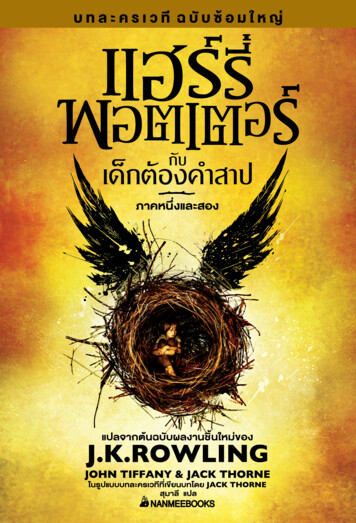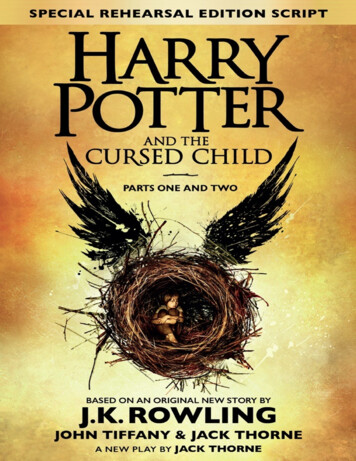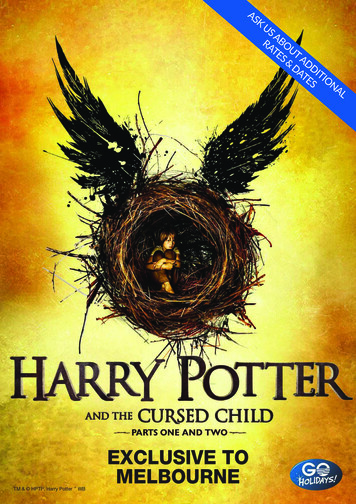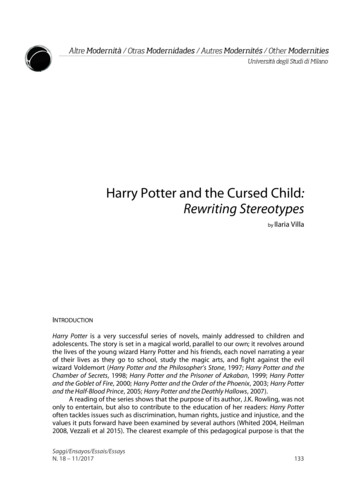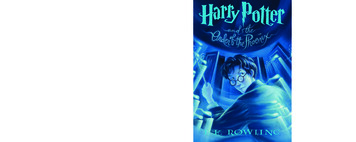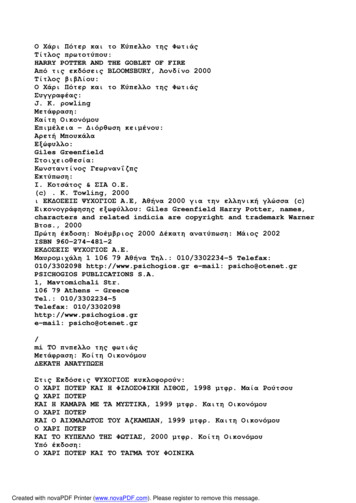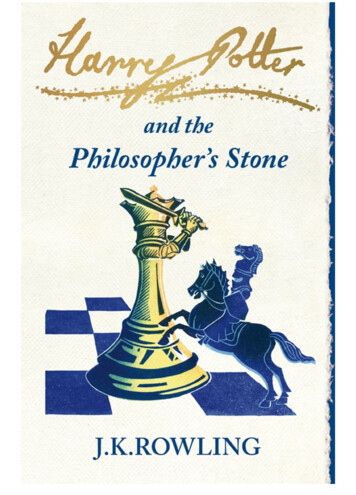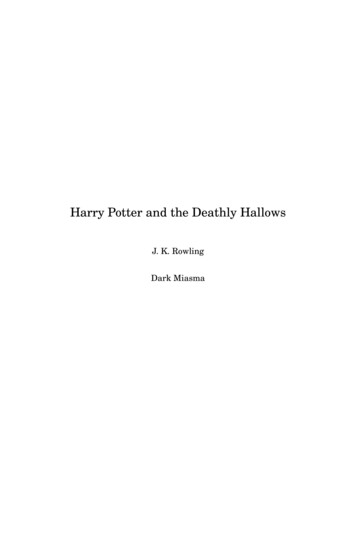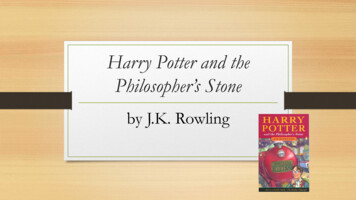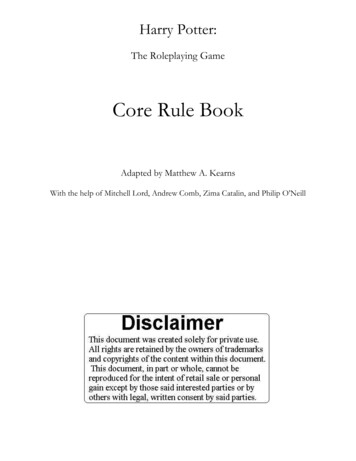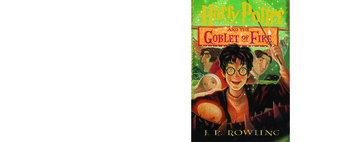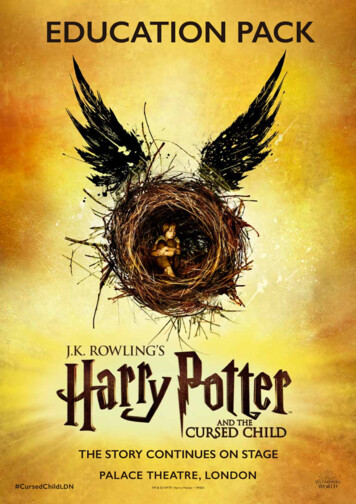
Transcription
EDUCATION PACKTHE STORY CONTINUES ON STAGEPALACE THEATRE, LONDON#CursedChild LDNTM & HPTP. Harry Potter WBEI
PROFESSORS,We trust that you will find the suggested activities within this pack useful foryour students. They will need only parchment, their quills and ink pots tocomplete them, as well as a keen mind and eye, of course.Some tasks can be adapted for you to use as part of formal exam preparation.Others allow students to explore, create and imagine. All skills, we are sureyou’ll agree, that are just as important as learning their charms and potions.Most importantly, students should have the opportunity to revisit theirenjoyment of the unique and wonderful Wizarding World.You will find opportunities here for work before and after your visit to theshow. But may we remind you to help keep our secrets; we will have nohesitation in using a memory charm on all of you if required Professors, look out for the following symbols which suggestdifferent types of activities you may wish to try:this symbol indicates anopportunity for students tocomplete a written taskthis symbol indicates anopportunity for a practicaldrama exercise or taskthis symbol indicates an extensiontask requiring higher level skillsor additional effortthis symbol indicates notesor examples that are providedas a starting point for theteachers use in activities andto aid lesson preparation2
BEFORE SEEING THE PRODUCTIONIn small groups ask students to consider the following: What do you already know about the production? What are you looking forward to? Having looked at the marketing and social media resources, what do you expect fromthe production? You might use the posters, website or Instagram page as a resource. What characters and settings from the Harry Potter stories do youexpect or hope to see? How do you think the magical world will be created? What techniquesand skills might be employed?Working on their own ask students to consider the following(these questions assume some knowledge of the Harry Potter stories): Do you have a favourite character from the Harry Potter stories? If so, why do youlike them? Can you remember specific qualities they have or moments that you enjoy? What do you remember about the stories? Can you create a list of words thatdescribe the kinds of things that happen to the characters, the emotions theyexperience and the atmosphere of the books? Write an email to a friend explaining that you are going to see the play.Include some of your thoughts and feelings about what you expect.Upon turning this page some of the many secrets of the production will berevealed. You are respectfully advised to only proceed when you have seenthe production to ensure maximum enjoyment and surprise.3
AFTER SEEING THE PRODUCTIONProfessors: These tasks are best completed as soon as possible after yourvisit. The tasks progress from helping students recall details from theproduction to formalising critical responses as far as may be required. Mostgrouping suggestions can be adapted. FIRST THOUGHTS: Using only single words or two-word phrases ask students torecord their first thoughts on the production. Encourage them to be honest and linkthoughts to their feelings and reactions first, before moving onto elements of thenarrative or characters that stuck in their mind. Students could write on Post It notesor small slips of paper that can then all be added to a board for shared discussion –this also allows you to explore patterns and links in their responses. You can groupsimilar Post It notes together to create a visual memory board. CIRCLE HIGHLIGHTS: This task asks students to focus more on the narrative andthe staging of the play. Seat small groups of students in a circle. First time around thecircle each student should each offer one moment of the story they remember as ahighlight. Second time around the circle students should offer a moment of stagingthey remember as a highlight. In the third time around the circle students should addto why they thought moments were highlights and can offer input on the suggestionsof others aiming to flesh out the details of how and why certain moments wereeffective or memorable. REVIEWS: Ask students to imagine they are creating new posters and marketingmaterial for Harry Potter and the Cursed Child. Working in pairs or individuallycan they create headlines or quotations as if taken from reviews that can be used toencourage people to see the show. You may choose to use real-life examples as astimulus. Students should be guided towards short, snappy statements and may alsowish to use a thesaurus to extend vocabulary.Writing a review – write a reviewof the production for your school newspaper or magazine. You may wish to read atheatre review first, online or in a daily newspaper to identify the key features ofa theatre review.4
GOALS: Working in pairs allocate each pair up to three characters from the play.They should then discuss what they feel each of those characters desire most inthe play; what is their goal? They may then reflect on how the goals may change ordevelop with the action of the play.‘Scorpius’ – for his father to see him actbravely and know him, to find great friends, to make Rose his girlfriend.Workingindividually ask students to note down their own goals perhaps in terms of family orschool or personal hobbies. Do they recognise any similarities with any charactersin the play? You may go on to discuss how our goals affect our behaviour andrelationships and/or how those goals might be achieved. FAVOURITE MOMENTS: Working as a whole class revisit the First ThoughtsPost It notes, the Review headlines and Circle Highlights. Ask students to selecttheir own favourite moment and working individually write a paragraph explainingWHY this moment was effective. Aim to use only one or two sentences to explainwhat happened in the moment and the rest of the paragraph to explain how themoment was presented and why it was effective.You may want students to swapparagraphs and use some simple marking criteria to look for how effectively they arefocusing on how and why moments were effective. SURPRISE: Think back to some of the many different locations and characters thatappear in the play. Which of these surprised you or were you not expecting? Selectone of your favourite unexpected moments either in terms of location or characterand discuss with a partner why it was so enjoyable. FEELINGS: Ask students to list the full range of feelings and emotions that they feltwhilst watching the performance then alongside this create a list of the feelings andemotions seen onstage. Think back to your expectations before the performance –does anything about the two lists surprise you? How did your feelings change from theend of Part One to the end of Part Two?5
PERFORMERS: Students should work individually and select two actors that theywould like to focus on for an extended critical response. Encourage them to selecttwo actors who are slightly different in their performance style, for example thetwo actors who play Scorpius and Draco or Harry and Delphi. For each actor selecttwo or three of their key moments in which their performance skills engaged theaudience. You may wish to first brainstorm performance skills to remind students and/or model an example on the board.The actor playing Draco engaged the audiencewith his physical and vocal skills. In his first appearance he stood with an upright posture andoften in a very static position using little movement but suggesting to the audience a senseof control and authority. However, he communicates his underlying hurt and concern with acertain restlessness as he delivers key lines “Astoria hasn’t been well” by pacing and avoidingeye contact. Similarly, he used a strong, deep voice with very clear diction sometimes almostspitting out words particularly at Harry but when talking about his family his voice becamesomewhat softer and more impassioned and pleading. He gave away little in his facialexpressions other than to sometimes frown showing his displeasure at having to ask Harryfor help and a frown to show his anger when it is refused.6
CHARACTERPROFILES7
HARRY POTTERNow a father to James, Albus and Lily, Harryworks as Head of Magical Law Enforcement atthe Ministry of Magic and is married to GinnyWeasley. Harry struggles with the demands ofparenting while still fighting against the forcesof Dark Magic. Memories from his childhood,and the pain and death he endured growingup and facing Voldemort, continue to haunt histhoughts. Despite this, Harry is now a grownman devoted to his family, wife and friends, andas ever, the importance of good over evil.HERMIONEGRANGERHermione is now the Minister for Magic, andis a strong leader, not afraid to stand up andconfront issues her predecessors tried toignore. She is married to Ron and has twochildren, a daughter Rose and a son Hugo,whom she adores. Her close friendship toHarry remains as they work together as a teamat the Ministry. Her fond frustrationswith her husband Ron remind us of the manysquabbles they had at school, but their devotionto each other is clear.8
RON WEASLEYA loving father and husband, Ron has twochildren that he looks after alongside runninghis own joke shop, Weasleys’ Wizard Wheezes.Affable as ever, Ron is a stalwart friend toHarry and a reliable and affectionate husband toHermione. As in his youth, Ron is determinedand quick to offer help to support Harry anddefend the Wizarding World.GINNY POTTERMarried to Harry, Ginny works as a sportseditor for the Daily Prophet. She standsalongside Harry as a supportive wife but alsohas to show great patience as he struggles withhis relationship with his son Albus, while stillgrappling with his past. She understands Harry’stroubled sleep and dreams and knows when heis not being totally open with her.9
DRACO MALFOYJust as devoted to his family as Harry Potter,Draco Malfoy is utterly committed to protectinghis son Scorpius whilst battling against rumoursabout him and his parentage. Draco continuesto mistrust Harry Potter and his many successesand openly attacks the decisions of the Ministryof Magic to try and get them to do what hethinks best. Always immaculately dressed,Draco reveals that for all his appearances ofanger, his actions are just as rooted in love andfamily as the other characters.ALBUS POTTERThe middle child of Harry Potter, Albusstruggles with the weight of his father’sreputation and past. He doesn’t fit intoHogwarts in the way he thinks is expectedof him. Surprised to find himself placed inSlytherin, he forms a close friendship withScorpius Malfoy, Draco’s son. Determined toprove himself, Albus is quick-witted and bravethough perhaps shows some of the recklessnesshis father occasionally showed in his youth,trying to solve problems without fully graspingthe dangers and consequences. Much of thetrouble with his father stems from Albuswanting to be his own man while also wantingto know his father more closely.10
SCORPIUS MALFOYExtremely bright, clever and well-read,Scorpius can’t wait to begin life at Hogwartsand all that will entail but he is well-awareof the rumours that surround his parentage.Close to his mother and keen to impresshis father, he has a great deal to endurebut reveals himself to be a devoted friend,brave wizard and extremely optimistic andenthusiastic young man. Scorpius is a characterwho never gives up and isn’t afraid to speak hismind when necessary.ROSE GRANGERWEASLEYAmbitious, clever and hard-working, Roseshares many of her attributes with her mother,Hermione and her father, Ron. She is eager toget to Hogwarts and begin her life there. Rosetries to remain friends with her cousin Albus,and despite drifting apart during the course ofthe action, it is clear she is likely to remain partof Albus’ life, and perhaps Scorpius’, forever.11
STAGING THE PLAYMagic and Illusion A world of magic and illusion is created from the very outset of the play. Ask studentsto describe how the wizarding world is brought to life in the production. They may listaspects of the set and design but also moments of magic demonstrated by props ormovement. You may wish to remind students of some of the following:Wands, sweets, bookcase in Hermione’s office, Dementors, telephone entry tothe Ministry of Magic, transformation using Polyjuice Potion, a Patronus, Draco andHarry’s duel, Trolley Witch (exploding pasties and transfiguring hands into spikes),levitating pews, Expelliarmus spell.It will be more constructive to focus on the effect the magic has on the audiencerather than trying to deconstruct how effects were created. Staircases – two large staircases on wheels can be moved across the stage byperformers to create the illusion of the infamous moving staircases at Hogwarts. Asperformers walk up and down the stairs, often whilst they are in motion, the illusionof a constantly changing space and shape is created. The sense of travelling fromone place to another around the school, and also the atmosphere of time and spaceshifting is enhanced. It also creates a sense of the characters confusion as they tryand solve the problems of the narrative. The staircases also serve a practical purposeof creating a range of other settings including a platform from which Hermione candeliver her opening at the special meeting at the Ministry and a place from whichstudents can listen in on Professor McGonagall’s office. The effect of movement is alsoenhanced through the use of music with faster tempo and louder music used whenscenes suggest the frantic atmosphere of time moving and a slower, more ethereal andsometimes threatening mood created by music in more sinister or eerie scenes.12
One of the most powerful moments of staging is at the end of Part One when theDementors descend onto the stage. Can you describe how this moment was createdusing a combination of performance and design? What impact did it have on you andaudience members around you?The Dementors appearance at the end of PartOne is highly effective. Performers shrouded in long black and grey Japanese organzadraped long over their bodies concealing their exact shape and face, swoop across thestage, eerily close to the audience. They appear to lean and reach out towards us asif trying to grab our souls. This movement is accompanied by a sound that begins as ashrill whisper and grows to a horrible screeching and screaming that gets louder andlouder to the point of considerable discomfort before snapping off to silence and acomplete blackout. The moment is extremely chilling and terrifying. It can be difficult to create fear and suspense on stage. In small groups with oneperson acting in a director role, can you create a short sequence without dialoguewhere one or more figures like a Dementor approaches an individual or the audiencein such a way that creates the same kind of atmosphere and response. You maywish to consider movement and gesture, use of levels, masks, costume, stillness vsmovement, music and sound.13
MOVEMENT The early scenes of Part One create a sense of the passing of time as well asthe infamous train journey aboard the Hogwarts Express. Discuss how this wascreated through the use of movement and simple props (cloaks and suitcases) in theproduction.Working in large groups or perhaps even as a whole class devisea sequence of action that suggests a busy train station and then a large numberof people travelling by train. You may wish to create a soundscape or use simplemusic to enhance the action but should focus primarily on individual and collectivemovement to create the sense of travel. We see Albus, Rose and Scorpius starting school at Hogwarts in the sequence thatlooks to capture some of the excitement and nervousness of their first day at school.How did this sequence make you feel? How do you think it captured the feelings ofsome of the characters?Working in groups create a sequence of action that usesmovement, gesture and facial expression to convey the feelings of different studentson their first day at school. You may wish to think back and draw on your ownexperiences of your first day. Your movements should suggest a range of differentpossible emotions and feelings and you may wish to add music to the sequence tosuggest an overall mood or feeling.14
The opening of Part Two looks to establish that we are no longer in a world whereVoldemort was defeated at the Battle of Hogwarts. This is a world where DarkMagic reigns. How has the changed state and atmosphere been created throughmovement?Movements are jerky, aggressive and hard. There are strongconnotations of a militaristic regime, suggestive of repression and control, echoedin the repeated gesture of wrists bound. This is all enhanced with the use of blackcostumes and cloaks that violently swirl and seem to conceal and remind the audienceof the swirling movements of the Death Eaters. The performers move as a groupand create harsh straight lines and shapes that again suggest control and strength.The final diamond shape converging on the audience suggests the size and scale ofan army that is controlling the world.Working in groups of four or six can youcreate a similar sequence that suggests the same intense atmosphere of repressionand control? You may wish to use music to enhance the sequence. One approachwould be to create three sequences in pairs that you present to the rest of the groupwhich you then work on bringing together to create the same dynamic conclusionseen in the production. Think back to the staging of the scenes from the Triwizard Tournament. How wasthe sense of the crowd watching the challenges achieved? What did the crowds addto those moments?Working as a large group create a sequence of action usingmovement and sound that conveys the sense of a crowd watching an event, perhapsa sporting event or competition. How can you use a range of performance skillsincluding gesture, facial expression and levels as well as sound and voice, to convey thefeelings and emotions of the crowd? Consider how you would stage the scene so thatthe audience are convinced something exciting is happening without actually seeingthe event itself.15
THEMESProfessors, some of these tasks are thinking points or questions for discussion whilstothers result in a more formalised response.Friendship‘I CAN DO IT WITHOUT YOU – BUT I WANT YOUTHERE – BECAUSE I WANT US TO DO THIS TOGETHER.’ALBUS POTTER When Rose and Albus first board the Hogwarts Express, Rose is keen to concentrateon carefully choosing who to be friends with. Albus seems unsure and says thatchoosing who you want to be friends with for life seems scary. What is yourexperience of first making friends? Can you ‘choose’ who to be friends with? If so,how would you decide? Think back to your own experience, perhaps on your firstday at school or first time at a new club or activity – how did you become friendswith people? Rose thinks that everyone will want to make friends with Albus and herself because oftheir family name and status. Do you think that can affect or create friendships? Whatfactors do you think create friendships and in pairs make a list or spidergram to sharewith the class.Possible suggestions: age, geography, family connection (parentsknow each other, sibling), shared experience, shared interest, similar style or clothes,similar attitudes or morals. Scorpius is clearly nervous about making friends knowing that the rumourssurrounding his parentage might affect people – particularly a Potter or GrangerWeasley – from being friends with him. His mum has given him some sweets sayingthey might help make friends. Do you agree? Have you ever used a similar tactic tohelp create friendships?16
Just before they find the Time Turner Scorpius says that there is a reason that he andAlbus are friends “a reason we found each other”. Do you have a friendship that givesyou a similar feeling? Harry knows the importance of his friendship with Ron and Hermione in helping himsurvive Hogwarts and even helping to save his life. We also learn that both Dracoand Ginny envied the wonderful friendships Harry had. Draco goes on to suggest thatTom Riddle’s loneliness may have been in part what led him to becoming Voldemortand that Harry must protect Albus from his own loneliness. Thinking back over thestory why do you think some characters become such good friends? Can you thinkof examples from the play where friendship is important? Think back to scenes thatshow friends sharing good times, sharing problems, offering companionship and givingadvice. In small groups discuss why friendships are so important? You need not referto personal examples but may wish to do so. Write about a personal friendship of yours and why it is important.Differentiation – for a more basic task focus on describing the friend and narratingthe friendship, a more advanced task would assess the qualities of the friendship andevaluate why the friendship is important. You may also wish to allow the option ofwriting about a friendship from the production rather than a personal friendshipdepending on the dynamics of your group.17
Family and Identity‘LOVE BLINDS. WE HAVE BOTH TRIEDTO GIVE OUR SONS, NOT WHAT THEYNEEDED, BUT WHAT WE NEEDED.’DRACO MALFOYProfessors – do make clear that for this section students need not discuss their ownfamilies unless they wish to and no-one should refer to a real family other than theirown. They can choose to focus on families depicted in the production (Potters, Malfoys,Granger-Weasleys, Diggorys) or use families from other books, films or television showsto explore these questions. We see Harry and Ginny desperately trying to protect their son and worrying abouthim. The second conversation between Dumbledore and Harry at the Ministry alsoexplores how Dumbledore tried to be a father figure to Harry but couldn’t protecthim as he wished to. In what ways do the characters in the play try to protect theirchildren and how similar is that to the ways your parents try to protect you? – Thinkof an example and in pairs, compare your thoughts. ‘You are a constant curse on my family’ – both Draco and Amos Diggory see Harry asresponsible for the fortunes of their families. How important is it for the audience tohear these ideas about Harry? Does it affect what the audience think of him? Albus and Scorpius both have difficult relationships with their fathers. During theheated argument in Part One, Albus says he wishes Harry weren’t his Dad and Harrysays he sometimes wishes Albus weren’t his son. What was your reaction to thismoment? Did it surprise you? Why do you think Harry became so frustrated withAlbus? Working in small groups discuss what you think makes a good father, you maydraw on some of the moments from the play or think of your own ideas. Scorpius, perhaps out of friendly solidarity, confides that he sometimes thinks he cansee his Dad thinking “how did I produce this?”. Discuss in pairs or small groups whatcan make relationships between parents and children difficult? Consider what might18
cause problems, how they might be resolved and when families might be closest?You should draw on what unfolded in the production as a starting point. Think back to the end of the play, how do you think the relationship between Harryand Albus has changed? You may wish to compare the closing scene of the play andthe conversation between father and son with the earlier argument in Part One. Following the first attempt to go back in time Harry decides that he is no longerconcerned with Albus liking him, instead he wants only Albus’ obedience in order, hebelieves, to protect him. Do you think Harry is right? Should parents be concernedwith their children liking them or obeying them? Starting school is often an important stage in beginning to develop our identities.At Hogwarts which house you are in becomes a significant part of your identity.When Albus is put into Slytherin by the Sorting Hat, Rose exclaims “This is nothow it’s supposed to be”. How did this scene make you feel? What do you think ofSlytherin house or any of the other houses?Re-enact the scene where the SortingHat is making its selection. You may choose to present the Sorting Hat as it is stagedin the production or you may devise another method. Focus on showing the reactionsof those around Albus, including Rose and perhaps Scorpius, Professor McGonagall,James Potter and other Slytherins. Try and get across to your audience a range ofdifferent feelings through their reactions. Draco suggests that growing up is the hardest job in the world. Do you agree withthis statement? What do you think leads him to say this? You may wish to commenton Albus’ realisation that his actions were rooted in feeling that he constantly hadsomething to prove.Write a persuasive article for your school newspaper inwhich you argue either for or against the statement that growing up, rather thanparenting, is the hardest job in the world. Can you think of any examples in your life where an important element of youridentity might be expected to be the same as your parents? Choice of career, sportingor artistic skills or physical attributes? Discuss in small groups how it feels to share inelements of your parent’s identity and how it feels to be different.19
Truth, rumour and dreams‘THE TRUTH IS A BEAUTIFUL AND TERRIBLETHING, AND SHOULD THEREFORE BETREATED WITH GREAT CAUTION.’HARRY QUOTING ALBUS DUMBLEDORE The link between rumours and truth is established early in the play and much of theaction is dependent on trying to prove truth in the face of rumour. In pairs quicklymake a list of all the rumours you can remember from the story in the production. Scorpius says “I know what the rumour is, and it’s a lie.” How does Scorpius seemaffected by the rumour that surrounds his parentage? He tries to use his physicalsimilarity to his father to disprove the rumour – his hair, his nose, and he is quick toaddress it rather than ignoring it. Do you think this helps? Why might this rumourbe so powerful? Why and how do rumours become so powerful?In small groupscreate a short scene where students are gossiping about the rumours about a newstudent at school. What might they discuss and what are their sources? Would anyonedefend the student or speak against the rumours? (Teacher note – ensure this scene isentirely fictional – no names need to be used) Draco seems to think that Harry refuting the rumours surrounding Scorpius wouldput an end to the story? Do you think this would work? Why or why not? Draco is initially dismissive of Hermione’s concern about Voldemort’s returnreferring to the regular rumours that appear in the Daily Prophet about his return.What part do you think the press and media play in creating rumours in the real world? Dumbledore reveals that he is aware perhaps through rumours about Harry and Albus.How does Harry react to the idea that there may be gossip about him and his son? Harry’s dreams – several scenes at first might confuse the audience about whatis reality and truth until it becomes clear they are Harry’s dreams. The dreamscontain scenes from the past, some of which the audience may be familiar with, butothers appear to show us new memories or things that never happened. As a classbrainstorm what you can remember from the scenes that contained Harry’s dreams.20
Aunt Petunia, his childhood, his parents Lily and James, snakes, Parseltongue,seeing Albus, voice of Voldemort, death?Writing to describe – workingindividually create a description of a dream you might have. You should use vividvocabulary and aim to include several of the features from the class brainstorm. Do you think dreams show truth? How might what happens in a dream affect ourunderstanding of what is true once we are awake? Ginny has spent many years with Harry and seems to know that his sleep is oftentroubled. The return of his dreams is a worrying sign. Growing up Harry had manydreams but in many cases these were created by Voldemort. Imagine you keep a diary.Write a diary entry where you explain what a friend has told you about their recentdreams and show the concerns you have about them.21
Time‘THERE IS NO ESCAPING THE PAST.’DRACO MALFOY Harry has many connections to the past that are explored in the production. Thinkback and in pairs discuss as many references as you can remember to his life as achild.The Triwizard Tournament, the blanket from his mother, the Sorting Hat,his relationship with Dumbledore, Hermione’s Time Turner, Bane and the Battle ofHogwarts, the Invisibility Cloak and Marauder’s Map, his scar hurting and his dreams. Albus says “A mistake has been made and we’re going to right it” and this is his reasonfor using the Time Turner. He wants to help correct what he sees as one of hisfather’s past mistakes and is convinced he must do it. Does Albus seem to understandthe power of time and changing it? What are the general consequences of Albus andScorpius returning to the past?Why do you think Albus is so convinced he mustcorrect the past? Think back to your work on families and identity. You may alsoconsider how the production explores Albus seeing this as “a journey” – what is it ajourney of or towards?22
In the second act of Part One how is it revealed that time has been changed by thefirst visit back to the Triwizard Tournament? How significant are these changes? Arethey what you would expect? You may also want to consider what doesn’t change.The changes after the second visit back in time are even more dramatic and severe.What do you remember has been changed?First visit: Ron and Hermione don’tget married and therefore Rose isn’t born (or Hugo), Hermione becomes a professorat Hogwarts and not Minister for Magic, Albus has been placed in Gryffindor. Secondvisit: Harry is dead, the world is under the control of Voldemort and Dark Magic,Dolores Umbridge is Headmistress of Hogwarts, Professor Snape is alive and
material for Harry Potter and the Cursed Child. Working in pairs or individually can they create headlines or quotations as if taken from reviews that can be used to encourage people to see the show. You may choose to use real-life examples as a stimulus. Students shoul
